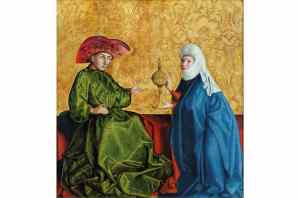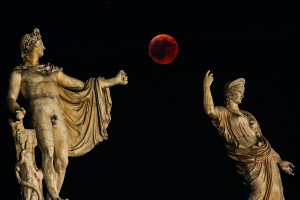We all know we’re modern, but how many of us can say why? My guest on ‘The Green Room’ this week, Italian writer Roberto Calasso, is a peerless explorer of what he calls the modern ‘revolution in the human brain’, and of the ghostly endurance of the old gods. His latest book, The Unnamable Present, is the ninth in a kaleidoscopic series which includes retellings of Greek and Indian myths (The Marriage of Cadmus and Harmony, Ka), studies of artists and writers (Tiepolo Pink, K, La Folie Baudelaire), the search for the origins of human society in sacrificial rites (Ardor, on the ancient Vedic civilization), and the tracing of the roots of the modern age in revolutionary politics and Romantic philosophy (The Ruin of Kasch, Literature and the Gods).
The ‘true historian’, Calasso has written, must crack the memorial ‘carapace’ of the past and become a creative channel for its contents. For the dead to speak, the historian must be attuned to the ‘psychic essences’ of his material, and the ‘resonances’ of the immaterial. Calasso rejects the academic specialization that divides knowledge into walled fiefdoms. Though he is fluent in history, philosophy, the arts and anthropology, he calls his books ‘literature’. For only literature, which is language at its most resonant, can unify the fields of knowledge and thus reflect the unified nature of its subject matter, life. As Calasso tells me, the historian is a kind of ‘necromancer’.
Every Calasso paragraph is an education, and this podcast, rich and expansive though it is, gives only a taste of Calasso’s writing and thought. We learn how, years after he had studied hieroglyphs in the writing of Thomas Browne at the Warburg Institute, Calasso found the figure of Talleyrand emerging as the ‘master of ceremonies’ as he wrote The Ruin of Kasch. How Tiepolo Pink emerged from the writing of La Folie Baudelaire, how Tiepolo, who died before the French Revolution, developed a globalized imagination, and how Calasso detected sacrificial motifs in Tiepolo’s engravings. How Calasso founded Adelphi Editions, his publishing house in Milan, so that the 3,000 pages of Nietzsche’s final notes, then only available in the corrupt versions issued by Nietzsche’s sister, could reach the reading public, and why Calasso feels that we can’t draw final conclusions from Nietzsche’s late writings. How Calasso came to be discussing Athens and Jerusalem with the anthropologist of sacrifice René Girard in Talleyrand’s study in the Elysée Palace. Truly, a ‘revolution in the brain’.

















